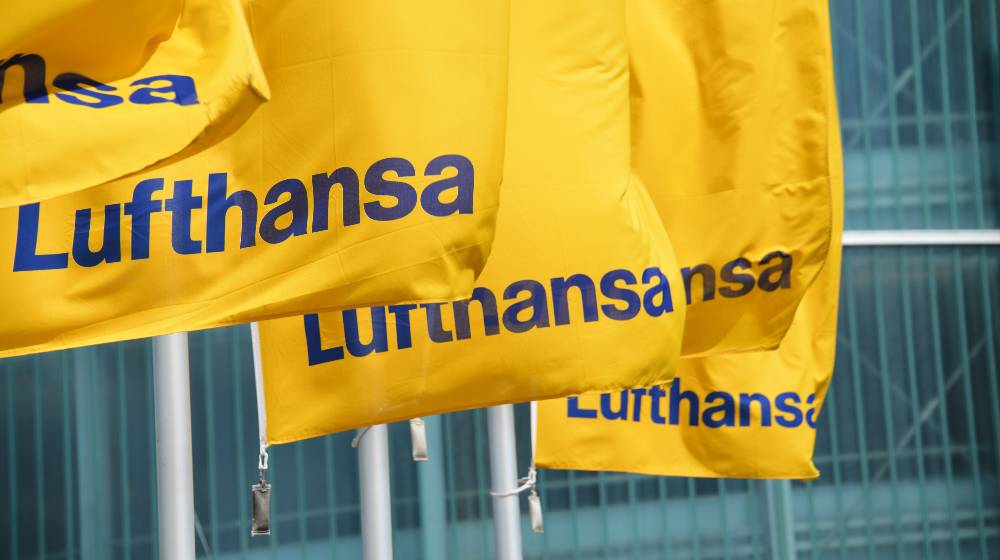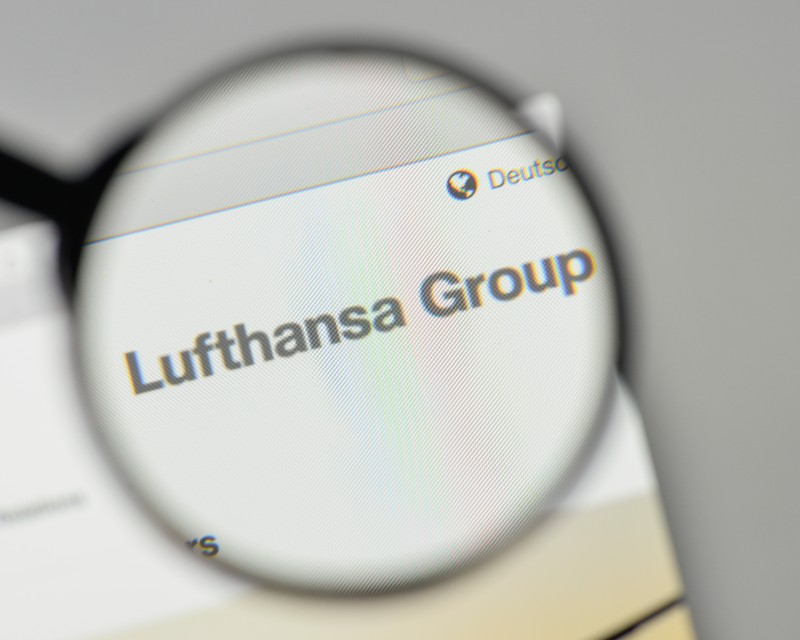Airlines
Lufthansa Group Returns to Profits in the Third Quarter

Lufthansa Group | People's desire to travel and the easing of pandemic-related travel restrictions led to a strong increase in demand for air travel during the summer months.
Business travel also recovered significantly over the quarter. At increasing load factors, the Group airlines were able to nearly double their capacity compared to the previous quarter.
Lufthansa Cargo achieved a record result also in the third quarter. As a result, the Lufthansa Group generated an operating profit in the third quarter of 2021 for the first time since the beginning of the crisis, despite high restructuring expenses weighing on the result.
Supported by the further opening of important long-haul markets for travelers from Europe, especially the US, new bookings increased significantly. At present, new bookings have reached around 80 percent of the pre-crisis level.
RELATED: Top 7 Most Expensive First Class Airline Tickets
Lufthansa Group Returns to Profits in the Third Quarter and Generates Positive Cash Flows Again

Carsten Spohr, Chairman of the Executive Board and CEO of Deutsche Lufthansa AG, says:
“With rising demand for business travel and a record result of Lufthansa Cargo we have mastered another milestone on our way out of the crisis: We are back to black.
We confirm our leading position among the world's largest airline groups. Now it is a question of continuing on the path of successful change.
I would like to thank our customers for their loyalty and trust, and all Lufthansa employees around the world who are contributing with passion and dedication to mastering the current challenges.”
Positive Traffic Development in the Third Quarter
In the third quarter of 2021, capacity offered, measured in passenger kilometers, was 50 percent of the pre-crisis level of 2019, about twice as high as in the second quarter.
Overall, the airlines of the Lufthansa Group carried 19.6 million passengers in July, August, and September. This represents 46 percent of the pre-crisis level in Q3 2019.
The seat load factor was 68.8 percent, 17.4 percentage points higher than in Q2 2021 (-17.5 percentage points compared to Q3 2019).
Third Quarter Revenue Nearly Doubled, Adjusted EBIT and Adjusted Free Cash Flow Positive
In the third quarter, Group sales nearly doubled (+96 percent) year-on-year to 5.2 billion euros (prior year: 2.7 billion euros). Adjusted EBIT excluding restructuring costs of 255 million euros was 272 million euros in the third quarter (prior year: -1.2 billion euros).
Including these restructuring expenses, Adjusted EBIT amounted to 17 million euros (prior year: -1.3 billion euros). Net income amounted to -72 million euros in the third quarter (prior year: -2.0 billion euros).
Adjusted free cash flow was 13 million euros in the third quarter of 2021, despite the payment of deferred taxes at Lufthansa Technik of 443 million euros.
The main reasons for the positive result were the good working capital management and the strong inflow of new bookings that continued in the third quarter.
Key Figures for the First Nine Months
From January to September 2021, the Lufthansa Group generated revenue of around 11 billion euros (prior year: 11 billion euros).
Adjusted EBIT improved to -1.6 billion euros excluding restructuring costs of 520 million euros (prior year: -4.0 billion euros).
Including these restructuring costs, it amounted to -2.1 billion euros (prior year: -4.2 billion euros). Net income for the first three quarters of the year was -1.9 billion euros (prior year: -5.6 billion euros).
Significant Progress Made in the Lasting Transformation of the Company
The Group continues the systematic implementation of its transformation program. In this context, measures have already been implemented that will eliminate costs of around 2.5 billion euros annually.
This corresponds to more than 70 percent of the planned annual savings of 3.5 billion euros by 2024. The measures implemented in the third quarter mainly related to process improvements at the passenger airlines, Lufthansa Cargo, and the Group functions, the continued transformation of sales processes, and closer cooperation between Lufthansa German Airlines and Lufthansa Technik.
The response to the volunteer programs offered in Germany for employees of Deutsche Lufthansa AG and Lufthansa Technik AG significantly exceeded original expectations.
Overall, more than 3,000 employees have opted to leave the Lufthansa Group voluntarily. Through voluntary programs, fluctuation, and social plans, in Germany alone a total of 4,000 employees have left the company so far is 2021, while agreements have been reached with 3,000 more.
This means that depending on further developments a surplus of 3,000 employees or corresponding personnel costs currently remains in Germany.
In this context, another volunteer program for cabin crews was launched at Lufthansa on November 1, which will run until the end of March 2022.
The Group assumes that the attractive program will help to reduce the staff overhang in the Lufthansa cabin in a fair and socially responsible manner.
In total, around 107,000 people were employed by the Group at the end of September. The goal remains to secure the long-term employment of more than 100,000 people in the Group.
Lufthansa Group Emphasizes Its Commitment to Sustainable Corporate Action
The Lufthansa Group has set itself ambitious climate protection targets and aims to halve its net CO₂ emissions by 2030 compared to 2019 and to achieve a neutral CO₂ balance by 2050.
To substantiate these net targets further, the Group is joining the so-called “Science-Based Target Initiative” (SBTi) to bring the CO2 reduction path in line with the United Nations Paris Climate Agreement.
CO2 emissions will be continuously reduced based on scientific calculations by the means of fleet renewal and optimization, improved operational efficiency, and the use of sustainable fuel. The official validation will take place in 2022.
As a tangible step on this ambitious reduction path, the Group's Executive Board has decided to proactively acquire sustainable aviation fuel (SAF) for 250 million US-Dollars over the next three years.
The Lufthansa Group is already the largest purchaser of sustainable aviation fuel in Europe and, with this decision, confirms its claim to be among the world's leading airline groups regarding the use of SAF.
Carsten Spohr, Chairman of the Executive Board and CEO of Deutsche Lufthansa AG, says:
“Climate change is the greatest challenge of our time. The purchase of synthetic fuel for a quarter of a billion US-Dollars in the coming years is the largest pure sustainability investment in the history of the Lufthansa Group to date. We stand by our responsibility with full conviction and are doing everything we can to make aviation even more sustainable in the future.”
Network Airlines With Improved Result, Eurowings With Strong Quarter
Network Airlines' Adjusted EBIT loss narrowed to -304 million euros in the third quarter when excluding restructuring expenses of 146 million euros thanks to increased demand and continued cost reductions (prior year: -1.2 billion euros).
Including restructuring expenses, the Adjusted EBIT loss amounted to 450 million euros (prior year: -1.2 billion euros). Average yields at Network Airlines were slightly higher than the pre-crisis level in the third quarter supported by strong performance in intercontinental traffic.
Eurowings generated an Adjusted EBIT of 108 million euros in the third quarter (prior year: -108 million euros). The consistent implementation of the turnaround plan launched in 2019 made a significant contribution to the positive result.
For example, the number of flight operations in Germany was reduced to one and administrative costs were cut by more than 30 percent compared to pre-crisis levels.
The strategic positioning of Eurowings as a competitive value airline is thereby been strengthened further.
Lufthansa Cargo on Record Course, Lufthansa Technik and Lsg Again With Profit
In the cargo business, Lufthansa Cargo continued to benefit from the ongoing high demand for airfreight in the third quarter. Adjusted EBIT in the logistics segment increased to 301 million euros in the third quarter (prior year: 169 million euros).
This forms a new record in the history of Lufthansa Cargo for this period. As in previous quarters, Lufthansa Cargo benefited from the persistently high demand in the global air freight market, which was amplified further by bottlenecks in sea freight and the disruption of global supply chains.
Market-wide supply remained below the pre-crisis level due to the still limited belly capacities.
Lufthansa Technik significantly improved its Adjusted EBIT in the third quarter to 155 million euros when excluding restructuring costs of 94 million euros (prior year: -79 million euros). Including restructuring expenses, it amounted to 61 million euros (prior year: -86 million euros).
Lufthansa Technik benefited from the industry-wide increase in demand for maintenance services as the global airline market recovered.
The LSG Group also improved its result thanks to the positive trend in demand, especially in the American markets. The Adjusted EBIT amounted to 35 million euros in the third quarter (previous year: -74 million euros).
Liquidity Remains Strong, Balance Sheet Ratios Improve Significantly
At the end of September 2021, the Group had total available liquidity of 11.9 billion euros at its disposal. Taking into account the proceeds from the capital increase, the repayment of Silent Participation I in October, and the repayment or respective termination of the remaining silent participations planned until the end of the year, the available pro forma liquidity as of 30 September 2021 amounted to 8.5 billion euros.
Liquidity, therefore, remains above the medium-term target corridor of 6 to 8 billion euros, even after the repayment of all stabilization measures in Germany.
The equity ratio, excluding the capital increase which was completed only after the end of the quarter, increased by 5.3 percentage points to 8.8 percent at the end of September compared to the end of 2020 (December 31, 2020: 3.5 percent).
Net debt was at 9.0 billion euros around 900 million euros lower than at year-end 2020 (December 31, 2020: 9.9 billion euros) due to the drawdown of Silent Participation I in the second quarter, which is accounted for as equity under IFRS.
Taking into account the proceeds of the capital increase and the repayment of Silent Participation I, this figure improves to pro forma 8.4 billion euros.
Remco Steenbergen, CFO of Deutsche Lufthansa AG, says:
“Our capital increase is an important building block in achieving our balance sheet targets by 2024 at the latest. It also enables us to complete the repayment of the stabilization measures in Germany faster than originally expected.
This means that we can now fully concentrate on implementing our cost reduction programs and increasing our cash flows, as well as preparing for possible divestitures of subsidiaries.”
Outlook
The Group expects demand to develop positively. At the end of the third quarter, new bookings had already reached around 80 percent of the 2019 level.
Tickets in the premium classes are, particularly in demand. A significant increase in the share of business travel is apparent across all travel classes.
The planned opening of the USA for travelers from Europe from 8 November has been generating a boom in demand in recent weeks and shown very clearly that the removal of travel restrictions has an immediate positive impact on customer demand.
Since the announcement of the opening, the number of weekly bookings has increased by 51 percent compared to the previous weeks.
This means, that new bookings on the transatlantic have now also returned to around 80 percent of 2019 levels, with the major metropolises of New York, Miami, San Francisco, and Los Angeles being booked particularly often.
The Lufthansa Group continues to expect capacity, measured in available seat-kilometers (ASK), of around 60 percent of the pre-crisis level in 2019 for the fourth quarter, confirming its capacity expectation of around 40 percent of the pre-crisis level for the full year 2021.
For the first quarter of 2022, it is targeting a capacity of around 65 percent of the level in 2019 and is expected to increase to around 80 percent in the summer and second half of the year.
Therefore, for the full year 2022, the company expects a capacity of more than 70 percent compared to 2019.
In the fourth quarter of 2021, Group EBITDA is expected to be positive, even assuming restructuring expenses of around 80 million euros.
The Group, therefore, expects to be able to avoid operating cash drain even in the seasonally challenging final quarter.
Therefore, for the full year 2021, the Lufthansa Group continues to expect a year-on-year increase in Group revenue and to reduce the Adjusted EBIT loss to less than half of the prior year.
You Might Also Like:
- Facebook To Shut Down Its Facial Recognition Program
- Jeff Bezos Pledges $2 Billion To Help Restore Nature
- Altice USA, Inc. (NYSE: ATUS) Holdings Raised by Bleichroeder LP
Keep up to date with the latest finance news by following us on Facebook and Instagram.
Article Source: www.marketscreener.com















